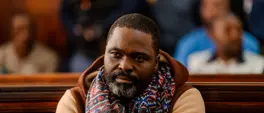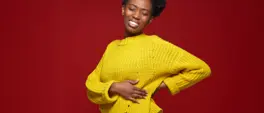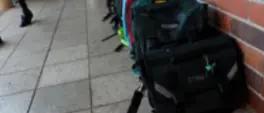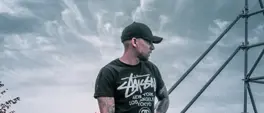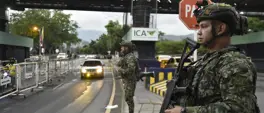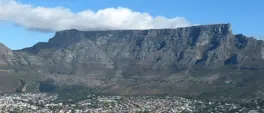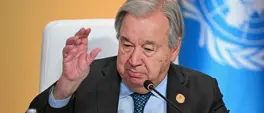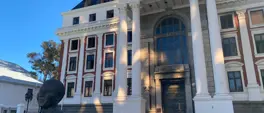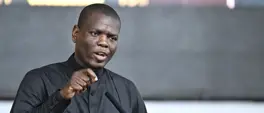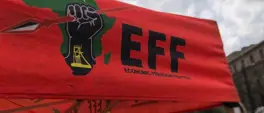CHARLES MATSEKE | Ramaphosa at the end of the road: Inside the coming ANC mutiny and SA's pre-2029 realignment
Charles Matseke
19 November 2025 | 17:33South Africa is entering a rare political moment, one in which the past and future collide around a single president whose mandate has collapsed under the weight of his own mythology, writes Charles Matseke.
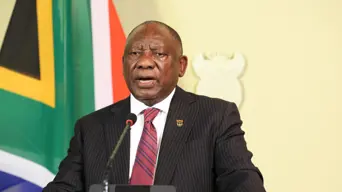
President Cyril Ramaphosa addressed the nation on 13 July 2025. Picture: @PresidencyZA/X
South Africa is entering a rare political moment, one in which the past and future collide around a single president whose mandate has collapsed under the weight of his own mythology.
If Cyril Ramaphosa is removed before 2029, the task team that steps in to salvage what remains of the ANC will likely be led by former president Thabo Mbeki, who has already signaled dissatisfaction with Ramaphosa on both ideological and personal grounds. At the same time, his other predecessor, Jacob Zuma, has already formed the MK Party as an external mechanism to weaken Ramaphosa from outside the ANC’s organisational centre.
We therefore confront an unprecedented scenario: two former presidents, historically opposed to each other, now animated directly or indirectly by a shared conviction that Ramaphosa’s presidency has failed so profoundly that it demands intervention. In a political culture defined by factional survival, this convergence is foretelling.
Ramaphosa’s catastrophic decline is no longer the subject of whispered speculation; it is recorded in the open. Letters expressing a loss of confidence are circulating among the ANC’ upper structures, including the NEC, ahead of the National General Council (NGC). The question is no longer whether attempts to remove him will surface, but whether he will survive them.
When Ramaphosa emerged as the “renewal candidate” in 2017, he inherited a party already crushed under the weight of its own contradictions, corruption, patronage, collapsing service delivery and declining electoral support. His appeal lay in his elite polish, corporate fluency, a reputation for negotiation, and the image of a man above scandal.
He campaigned as the anti-Zuma ethical, disciplined, metropolitan. The ANC’s urban middle class and corporate South Africa embraced him as the final chance to rebuild the state. But the promise of a New Dawn has curved back on itself. Eight years later, the country is in a deeper crisis socially, institutionally and economically than anything witnessed during the tail-end of the Zuma administration. The social compact never materialised and social cohesion is nonexistent. The economy is structurally stagnant. And the elite networks Ramaphosa vowed to confront have mutated into something more sophisticated: an oligopoly with the presidency at the centre.
As I argued in my article South Africa’s Quiet Privatisation and the Birth of an Oligopoly (EWN, 15 October 2025), Ramaphosa’s tenure has accelerated the fusion of public power with private capital, creating a gated political economy in which conglomerates and ultra-elites benefit from curated reform. The state, I wrote, is not being rebuilt, it is being rearranged.
His politics of eloquence became a form of moral theatre, ethical language without ethical action. In How the Madlanga Commission Became a Chessboard for Power (EWN, 14 October 2025), I highlighted how commissions of inquiry have become instruments of elite management rather than mechanisms for justice.
Ramaphosa excelled at this approach.
Every scandal was absorbed into a commission, delayingconsequences while maintaining the illusion of accountability. In reality:
• Phala Phala exposed dollar-stuffed furniture and a president who behaves more like a shareholder than a head of state.
• IPID’s classified documents, held back to shield him, demonstrate how oversight institutions bend to protect him.
• Reserve Bank and SARS interventions raised questions of selective enforcement.
• The disbanding of specialised police units, including the Political Killings Task Team, narrowed the sites of accountability.
South Africa’s problem is no longer corruption, it is the curatorship of corruption.
This is the essence of the Republic of Commissions, where investigations replace justice, and truth becomes a narrative battleground rather than an evidentiary process. As I argued in Parallel Probes: Politics, Power and Truth (EWN, 10 September 2025), parallel investigations have become a hallmark of executive survival. Under Ramaphosa, they serve to muddy the waters, disorient the public, and fracture institutional focus.
Lest we forget the pressure points that unseated previous presidents:
• Mbeki was removed after losing internal legitimacy and being perceived as detached from organisational realities.
• Zuma was removed due to public anger, internal revolt, and the ANC’s fear of electoral suicide.
• Motlanthe was a placeholder whose removal had been written into party dynamics long before Polokwane.
Ramaphosa now sits at the intersection of all three:
• like Mbeki, he is perceived as aloof;
• like Zuma, he is weighed down by scandal and elite networks;
• like Motlanthe, he risks becoming a transitional figure in a factional environment beyond his control.
Behind the façade of business acumen and global respectability lies an unresolved cluster of scandals:
• Marikana (still politically radioactive).
• Phala-Phala (a constitutional embarrassment).
• Maumela, Chauke, Matlatla, and the Tembisa Hospital scandal (implicating networks close to him).
• Security failures under his watch.
• Attempts to manufacture consent or shield investigations.
Elite protection can hold for years, until it doesn’t. The ANC has historically sacrificed presidents when electoral danger becomes existential. The 2026 local government elections will be brutal, and the party already anticipates catastrophic losses. When the ANC looks for someone to blame, it will not look at structural failure, it will look at Cyril Ramaphosa.
The ANC’s internal dynamics are increasingly resembling a game-theory standoff, where factions intentionally refuse cooperation to weaken the president’s authority. This strategy has several features:
• delayed implementation of presidential directives.
• policy sabotage through bureaucratic inertia.
• public distancing by influential leaders ahead of the NGC.
• fragmentation within the GNU, undermining Ramaphosa’s legitimacy.
• amplification by NGOs and media, who sense political blood in the water.
• intra-party leaks designed to erode credibility.
This is not chaos, it is strategy. It is how political organisations prepare for succession without announcing it. And it mirrors precisely what happened to Mbeki and Zuma before their removals.
When Prince Mashele said Ramaphosa would go down as “the most useless president in South Africa’s history,” the comment sounded provocative, even exaggerated. But as the scandals mount and elite networks tighten around him, that assessment is beginning to find grounding.
The ANC’s pathway to 2029 travels through several political choke points:
• National General Council (NGC): 2026 - The first formal platform where a recall can be justified.
• Candidate selection battles: 2027–2028 factions will fight to reshape the ANC slate, using Ramaphosa as the scapegoat.
• Local government elections: 2026 Poor performance will be blamed squarely on the president.
• The GNU fragilities: Pre- and post-2026 partners question Ramaphosa’s authority and legitimacy.
As these pressures accumulate, the ANC will not wait until the eve of the 2029 election to make its move.
South Africa is entering a period of political re-ordering where:
• the ANC will fracture;
• the opposition will be forced into pragmatic alliances;
• and new movements, mass-based and non-racial, will emerge as credible alternatives.
The 2029 realignment will not be triggered by ideology alone; it will be shaped by institutional exhaustion. The country is tired of elite-managed politics, corporate-shielded presidents, and the revolving door of commissions without consequence.
Ramaphosa’s fall, whether formal or political, will be the catalyst for this transition. Cyril Ramaphosa is not merely stumbling; he is being prepared for political exit. Two former ANC presidents are already positioned against him, factions have withdrawn cooperation, and the scandals no longer orbit him they define him.
South Africa stands at a threshold. If the ANC removes Ramaphosa, it will be an act of political self-preservation, not renewal. If it keeps him, it risks further collapse.
Either way, the New Dawn has ended. The dusk is here. And the country is once again searching for a way out of the political nightfall.
Charles Matseke (MPhil in Politics and International Relations) is a researcher and writer with a keen interest in contemporary political dynamics. His research focuses on electoral politics, foreign policy analysis, and international relations, with a particular emphasis on the Global South and Africa's role in global affairs.
Get the whole picture 💡
Take a look at the topic timeline for all related articles.
